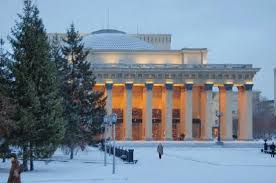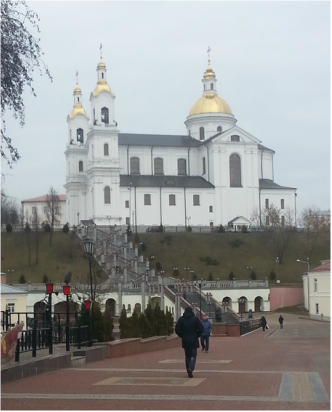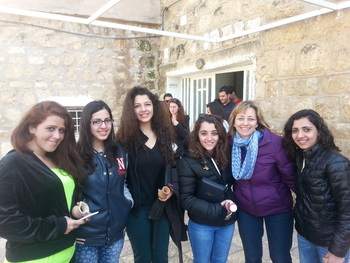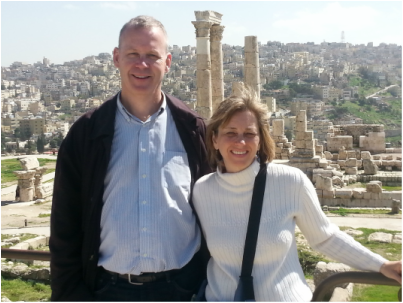 As we crunch through snow and slide our way along icy paths, with me (Lisa) managing one solid, hip-banging fall, it seems fair to say that spring is not quite here yet in Novosibirsk, Siberia. The temps are up significantly from January, but I think even the hearty residents of this city would love to see a flower or two and an end to the need for multiple layers. I’m aware that we get to head on in a few days, while our new friends here have at least another month of relative cold ahead. I’m hoping this is our last really wintry locale, as we head south to Georgia on Thursday and as spring comes to Eastern Europe/Eurasia. I’m counting on it, because I plan to leave a few layers here to lighten my duffle bag. I found a huge shawl on sale in London in February, which has subbed in nicely for a parka, covering my legs in ways my short jacket couldn’t. But it’s bulky. I’m leaving it here along with the cute furry earmuffs I bought in a desperate moment in Moldova, my winter pj’s, a worn white turtleneck from Boston days, and some ancient long underwear from that era as well. It’s spring-cleaning for my luggage, if you will, in the absence of floors to mop this year. This will be my third shedding round on this trip. I hit moments when the impulse to lighten the load outweighs the value to me of the stuff I’m carting around. Shedding always involves a certain feeling of risk—what if I miss it once I’ve let go of it? What if I’m sorry I don’t have it any more? It’s a microcosm of the losses and gains involved any time we venture out, risk, or even give ourselves to others. Will we be rejected? Will it be worth it? The arrival of spring (at least on the calendar, if not in Siberian temps) also makes me aware that we have been away from our home for a stinking long time. A solid three seasons ago, we shed the comfort and stability that our home offered us, for the opportunity of ministry that duffle bags and many temporary homes provided. We paid a cost as we began, in all the effort it took to clear out our home, arrange renters, sell our car, etc. And we pay certain costs all along the way—it’s been a joy-filled journey but I especially am weary of the suitcase life. We have gone hard the last few weeks, no question. That is good--we’d much rather that than be sitting around underutilized, as we have experienced in a couple of places. But we are tired. We have one more stop, which promises to be full as well, in Georgia. Then we get a blessed vacation, thanks to the amazing generosity of friends of friends. We hope it will be a kind of spring-cleaning for our hearts and renewing to our bodies, giving us the ‘spring’ in our steps that we need for the final stretch. But in four months we will pay a different set of costs, as we return ‘home’ in late July but aren’t able to move into our actual home until September. We’re immensely grateful for the housing God has provided for those five weeks, but we and our kids, when they come to LA in August, will no doubt be wistful for our own home, with its rusty old barn, oranges, lemons and backyard fire-pit in the evenings. It’s worth counting that cost ahead of time, praying for the grace to be willing to gladly pay it, and confidently hoping we’ll still say, “We wouldn’t trade the stability we lost this past year for the joy that the year has been.” While we can’t name or post photos of the faithful servants we’ve met here, the memories of the opportunities to come alongside them will form part of what helps us pay that cost in August. Thanks for your prayers as we continue the journey. I (Lisa) would humbly ask for your prayers for work in the year ahead: I have applied for several jobs, been a finalist but not the finalist for one, heard nothing from a few, and am waiting on one more. I trust that God has good work for me to do next year, but I’m frankly a little discouraged on that front these days. Thanks.
3 Comments
 When we left the US in August, our first stop was Belarus, where I taught a leadership conference for IFES students. This event was well received, and the team invited us to return to Belarus for two weeks. It was not certain that we’d return. It is both time-consuming and expensive to secure visas (about $600 to pay all the costs associated with getting the visas and supporting documentation). When we finally did secure our visas, Lisa’s remark (after the tally of the costs) was, “Let’s make this trip worth it.” Well, our two weeks in Belarus just ended this morning, and it was certainly worth it. As we have left the country, it will be safe for us to mention some of what we did, although we cannot mention any names and will obscure things somewhat. We were doing nothing illegal, but the IFES work in Belarus must operate in the murky shadows, not illegally, but not officially registered with the government, either. As we have done in other countries, we tried to set up talks at universities around Belarus where we could offer the training we have to offer to groups of students who don’t know about IFES and mostly are not believers. But unlike in other countries, we were met with a great deal of openness and welcome, and between us taught 9 or 10 times at 6 or 7 universities around Belarus. I spoke on Situational Leadership, which I have posted about before, a secular training program that I believe is both biblical and very helpful for college students. Lisa taught a Public Speaking Workshop, at which she taught principles of preparation and delivery, and each participant was asked to make a sales pitch about an item they pulled out of a bag, with minimal prep time. The only requirement is that they had to sell the item based on its use as something other than what it obviously was. Humor, quick thinking, and strong emotional appeals predominated in a short and fun session. Once each week I spoke on the topic “Ancient Wisdom for 21st Century Leadership.” These sessions were publicized during the Leadership and Public Speaking class sessions in various locations, and both believers and non-believers came to hear more teaching on the topic of leadership, this time with a focus on Jesus’ teachings and their (perhaps surprising to some) relevance for today. Between the two sessions there were probably 80 students total, and as many as half of them were not believers. The two-fold goal of these sessions was to introduce students to Jesus and what he has to offer as a teacher and leader, and to introduce students (believers and non-) to the IFES group and how it helps people grow as disciples and as leaders. It was clear that the sessions went very well, as students stayed around afterwards to ask questions of me and my hosts, staff for the IFES movement. Our hosts were very pleased by the attendance and interest level at all the sessions we held. One of the reasons we like being in this part of the world, and in Belarus especially, is that students are very motivated to practice their English. In several of the teaching settings, we even taught in English without the need of translation, to advanced students who were studying languages or business. Belarussian students were eager to have pictures taken with us, and always wanted to know what we thought of their country. The answer, “The people are very friendly” was usually welcome, and had the added benefit of being true. We did also enjoy Minsk, which is a beautiful city with some great architecture, though early March is admittedly not the best time of year to be walking about or enjoying the parks. Our final day of teaching was a staff team meeting during which Lisa taught on team building and public speaking, and I taught on leadership development, training and coaching. It was a very encouraging time to be with a group of staff we esteem and enjoy, and during the day we began to make plans for a possible third visit to Belarus before our year winds up in late July. As the day drew to a close, the team surprised us with gift tickets to the opera, to see Tchaikovsky’s Iolanthe, a simple and beautiful story that ends happily and with the entire cast singing praise to God for his goodness. With the English subtitles beneath the stage, we could follow along and even work a bit on learning Russian. It was a beautiful way to end a great two weeks. We do hope God opens doors (and provides visas) for us to return to this land where the gospel is needed and the people are receptive. (* Opera, from the latin, meaning work or labor. We did labor here in Minsk, and were also given opportunities to enjoy the opera of others...)  Five Quotes That Sum up My Experience of Jordan “Don’t worry…we don’t understand what we’re saying half the time, either!” “Wow, Arabic is an even more difficult language than I’d thought!” (Smiling slyly) “Oh, yes.” One of my new student friends and I had this exchange after I’d been standing for a while with a group of students who were engaged in a lively debate. (Many have excellent English and they often switched into it to welcome me.) I’m pretty sure she was kidding, but it was a sweet way to include me, and a great example of Jordanian humor. We’ve rarely been among students who have laughed so much together. “My parents named me ______! It’s not even a Jordanian name! I googled it and it means Feeding Chicken in Persian. What were they thinking?” This young man lamented his name as he introduced himself to me. Many of the students proudly shared that their names have meanings like Light, Beauty, Joy, and Strength. I doubt his parents had hens in mind when they named him, but in a country where names matter a lot, his was a bit of a disappointment, to him most of all. It didn’t seem to be stopping him from dreaming big dreams for his future and going for it with an entrepreneurial zeal that marked so many of the students we met. “Oh, you are from the United States! I went there a few years ago with our Track and Field national team while in high school. Everyone asked if we lived in tents and rode around on camels.” Ouch, this one made me wince. Amman is a very modern city, and in fact quite a car-oriented culture. The royal family has created an Automobile Museum which tells the story of their family and country through some of the cars and motorcycles they have driven over the past eighty or so years. The irony today of course is that while only a few Bedouins in Southern Jordan still live in tents, thousands of Syrian refugees are now living here in them, enduring a particularly cold winter, as this article describes. “I feel like a unicorn every time he says that here—like he’s saying I’m an animal everyone agrees does not exist.” “Yes, but we see you right here in front of us, and now we know that you do exist, and we are interested. We want to know more. Tell us how you were called into ministry.” The first line here was me (Lisa), after Rich had made a point of saying that his wife is an ordained minister. He has done all the teaching in the student ministry and churches here in Jordan, where women are very rarely in any church leadership roles beyond ministry to children and other women. I’ve appreciated how often he has wanted to work that into the conversation, but I never know how it will be received, given that it simply isn’t part of the church culture here. I suspect that many at the church think that I am simply in error or disobedience. So it was refreshing at the student conference to have students ask questions like the young woman here did. It made me feel that I was serving as a witness to what is possible for the women here, even though I did not formally teach or preach.  “We are living the book of Acts. We have prayed as a church to be used by God and to see miracles, and today we are seeing them over and over. It is such an exciting time for our church, even in the midst of tragedy.” The man who translated for Rich at church tonight shared this. He was referring to the ways God has blessed their church as they have reached out to the Iraqi refugees who have been fleeing ISIS in the past several months. Their church has more than tripled in size, as many of the refugees are at least nominally Christian and have been eagerly attending the multiple new Bible studies they have started to accommodate them. These refugees are mostly not in camps; they often come with some resources as they have been business people in Iraq. So they are living in simple apartments in the neighborhood around the church. But they have lost so much. One man who’s begun worshipping here lost his wife and daughter to ISIS plunderers of his town. The Iraqis are not allowed to work here in their current status, so finances are very tight. The church sends teams out to visit them, pray with them, and bring bags of groceries, etc. Church members are being transformed by this ministry, and refugees are coming to a deeper faith than they had known at home. So, as you read about ISIS and the ugliness and tragedy they bring, know that while it is tragic, it is not the only story here: God is powerfully at work to bring good out of evil. |
Archives
April 2024
AuthorRich and Lisa Lamb Categories |
 RSS Feed
RSS Feed